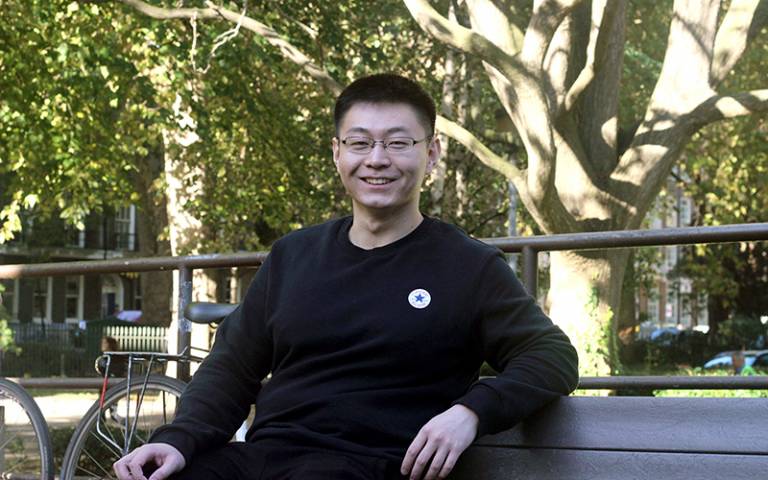Yuanmo is a final year Social Sciences BSc student from China. He tells us about his university experience in the UK.

Hi Yuanmo! What made you choose your particular degree at UCL?
When applying to university I knew that I wanted to become a social researcher and go on to do a Master’s and PhD to become a professional researcher but I wasn’t sure which specific area I wanted to dig deeper into. I wanted to study Sociology and Psychology, but I found that at most other universities in the UK you could only study one or the other. The programme at UCL stood out to me because it provides me with a chance to do a bit of both so that I can figure out which area I want to specialise in for my future career. I have really enjoyed my time studying Social Sciences at UCL - I get exactly what I want from the programme.
I also really liked UCL’s philosophy regarding diversity and inclusion. When I was researching universities I liked that UCL highlighted that they were the first to provide degrees to ordinary people, regardless of their position in society, and also the first university to admit women on equal terms with men.
What is the biggest challenge you face while studying?
The biggest challenge for me has been time management. I am the type of person that wants to focus on one thing for a long time but that kind of approach is not practical because I have at least three or four modules per term and I have different essays, presentations and other kinds of assignments to do. I have to break my days into sections and plan my time accordingly. Time management is definitely something you develop over the course of your degree.
What have you found most valuable here?
I think the most valuable thing has been my teachers. My personal tutor and my module lecturers are very helpful. They are all very good researchers and have made their own contributions to academia, but also they are very friendly and approachable. Before I got to know them I thought there would be a distance between students and teachers but that is not the case. They really care about my experiences; not just academically but they have given my lots of helpful suggestions about pursuing a career in research.
“Over the summer, I assisted my Social Psychology lecturer on a research project. The project went so well that the research is actually being carried on now and I am continuing to assist. If we are lucky we may be able to get a publication out of it so it has been a really great opportunity for me.
What has your experience been of moving to and living in London?
It is expensive but I really enjoy it. For a person who enjoys lots of different forms of art there are so many opportunities in London – there are musicals, there are art galleries all types of artwork and there are lots of different shows. There are lots of things to do to open your mind and to give you a break from academic work.
Even for introvert or shy people like me, you can still meet so many different people who are very driven and who are trying to pursue their own dreams which is very motivating. There is a positive energy in London.
How do you think the system of learning/researching at UCL differs from that in your home country?
It is very different. In China, even in universities, the main learning experience is the teacher telling you what to do and then you do it. In the UK, the teacher gives you a direction and you explore it by yourself. Compared with my friends’ experiences in Chinese university I think the academic experience here is more intensive because we have so many readings to do but I like having the freedom to discover a topic independently.
What do you do when you’re not studying?
I watch YouTube videos and some Chinese TV shows. Or I go out with my friends. I am also a part of the publication team for the Chinese Students and Scholars Association. In my first year I wrote promotions for them to advertise the activities of the society and then in my second year I supervised new members when they were writing promotions.
What was living in university accommodation like?
I lived in International Hall in my first year which is a University of London hall of residence. It was catered accommodation so the dining room was a great place to meet people and have a chat.
How easy was it to settle in at UCL?
I found it quite easy to settle in, I didn’t really encounter any problems. All the lecturers were really friendly and so were my classmates. Also we were given a Personal Tutor and a Transition Mentor in our first year to help us settle in. A Transition Mentor is a second year student, on the same programme as you, who can give you tips on how to adjust to university life. I became a Transition Mentor in my second year and I found it really rewarding.
What do you hope to do after completing university?
I hope to become a social researcher. I use the UCL Careers Service quite frequently. In my first year, I talked to them and asked them about potential career directions. During my second year, I applied for summer research projects and I asked them for feedback on cover letters and my CV. This year I am applying for Master’s programmes so I have asked them to review my personal statement and CV. I have found their feedback really useful. They have given me both general feedback and specific advice on areas to improve.
What would you say to somebody thinking of applying to the IOE to study your course?
I would encourage them to apply for this course. The degree is very suitable for people, like me, who don’t have a solid idea on one direction but want to explore more. You will learn so many things and you might even find something new.
There are many good lecturers in our department and the design of the modules is very good. For instance in my module Social Mobility and Inequality, as there are so many debates about social inequality issues, each week my lecturer gives us two exemplar papers from opposite sides of a debate so that we can see valid points from both sides. Reviewing these papers is really helpful to build up our critical thinking and have a more general and comprehensive view of the subject.
 Close
Close


